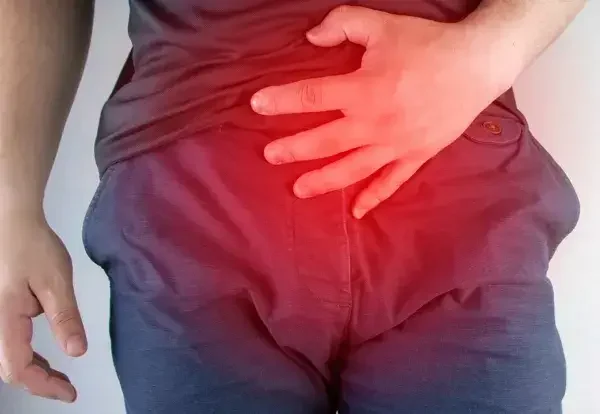Prostate health is an often-underestimated aspect of male well-being, playing a central role in a man’s overall health. While this article is written from the perspective of a woman who cares deeply about men’s health and wellness.
It compiles crucial information to help every man better understand and care for his prostate. Our goal is to provide clear, practical advice to maintain prostate health and prevent potential problems, including prostate cancer.
Prostate Health, what is the Prostate and Why is it Important?
The prostate gland is a small, walnut-sized organ located beneath the bladder, encircling the urethra. It is an integral part of the male reproductive system, producing seminal fluid the part of semen that nourishes and transports sperm.
Prostate health directly impacts a man’s ability to urinate, his sexual function (erection, orgasm), and even his ability to father children. In other words, the prostate is responsible for what we often refer to as the “essence of a man.”
When something goes wrong with the prostate, it can lead to a range of uncomfortable symptoms and significantly affect quality of life. Unfortunately, prostate problems are common, and their prevalence increases with age.
Prostate Problems and Age.
A Growing Concern.
Historically, prostate diseases were thought to primarily affect older men. However, recent years have seen a concerning trend: the age threshold at which men begin to suffer from chronic prostate ailments has sharply decreased.
Today, prostate changes in various forms are found in approximately 50% of men examined at just 40 years of age. Even more alarming is that young men are increasingly seeking medical attention for prostate inflammation (prostatitis).
These trends underscore the importance of paying attention to prostate health from an early age, rather than waiting for serious problems to emerge. Proactive care is key to preventing long-term issues.
Enemies of Prostate Health.
Common Lifestyle Pitfalls.
Many factors often taken for granted or considered insignificant can profoundly impact prostate health. Let’s explore some of them:
• Inappropriate Clothing: Constant wearing of tight-fitting underwear, especially made of synthetic materials, can contribute to overheating of the testicles. Prolonged overheating of the external genitalia can lead to testicular atrophy, which, in turn, can negatively affect the normal functioning of the prostate gland. Opt for loose, breathable cotton underwear.
• Sweetened Carbonated Drinks: A new study conducted at Lund University in Sweden and published in scientific literature has revealed a worrying link between the regular consumption of sweetened carbonated beverages, such as various types of cola, Fanta, and lemonades, and an increased risk of prostate cancer.
The study’s findings, based on over 15 years of observation, suggest that consuming approximately 300 grams of these drinks daily can increase the risk of prostate cancer by a significant 40%. This means that even a single small 0.33-liter can of cola every day could substantially elevate the risk.
These conclusions are supported by Dr. Isabel Drake, one of the study’s authors. It is highly recommended to replace these drinks with water, unsweetened tea, or natural juices.
• Unhealthy Lifestyle in General: Poor dietary habits, lack of physical activity, smoking, and excessive alcohol consumption all negatively affect overall health, including the condition of the prostate.
Each of these factors contributes to systemic inflammation and oxidative stress, both of which can compromise cellular health, including that of the prostate.
Early Diagnosis and Regular Check-ups.
Your Health, Your Responsibility.
Just as you care for your car by regularly performing maintenance and addressing minor defects before they turn into serious problems, you must also take care of your health.
Many men who are technically knowledgeable and meticulous about choosing auto repair shops unfortunately tend to neglect their own health check-ups.
Why Are Regular Check-ups Important?
• Early Symptom Recognition: Prostate problems can initially be asymptomatic or manifest with mild symptoms often ignored. Early recognition and diagnosis are key to successful treatment. Catching issues in their nascent stages significantly improves outcomes.
• Standardized Symptom Scales: Modern guidelines for prostate treatment often rely on standardized symptom scales, such as the International Prostate Symptom Score (IPSS). These scales include seven questions that accurately reflect urinary tract symptoms:
◦ How many times do you wake up at night to use the toilet?
◦ Have you recently needed to urinate more frequently than every two hours?
◦ Do you have to strain to start urinating?
◦ Is your urine stream weak or interrupted?
◦ Do you feel like your bladder isn’t completely emptied after urinating?
◦ How often do you have a sudden, urgent need to urinate?
◦ How often do you experience urine leakage?
Answers to these questions provide your doctor with valuable information about the prostate’s condition and help select the most appropriate treatment strategy.
More information about symptom scales and other details regarding prostate diseases can be found on the Association of Urologists website: https://uroweb.org/
• Regular Medical Examinations: For men over 40, regular prostate check-ups are recommended. These include:
◦ PSA (Prostate-Specific Antigen) Blood Tests: PSA is a protein produced by the prostate gland. An elevated PSA level can indicate prostate problems, including cancer. While PSA tests are a valuable screening tool, it’s important to discuss the results with your doctor, as elevated levels can also be caused by non-cancerous conditions.
◦ Digital Rectal Exam (DRE): During this examination, the doctor manually checks the prostate through the rectal wall to assess its size, shape, and texture, and to detect any lumps or irregularities. This is a quick and effective way to physically examine the gland.
◦ Other Examinations: Depending on symptoms and initial test results, your doctor may recommend additional tests such as ultrasonography, urine flow measurements, or a biopsy. These further tests help to confirm a diagnosis and determine the best course of action.
Prostate Treatment and the Importance of a Healthy Lifestyle
The treatment and prevention of prostate problems are complex and can vary depending on the severity of the disease, individual health needs, and other factors. However, some general recommendations can help maintain prostate health and reduce the risk of developing prostate problems.
Core Principles of a Healthy Lifestyle:
• Balanced Diet:
◦ Include plenty of vegetables and fruits rich in antioxidants and fiber. Especially recommended are tomatoes (containing lycopene), broccoli, cauliflower, cabbage (containing indole-3-carbinol), and berries. These foods help fight inflammation and cellular damage.
◦ Prioritize healthy fats found in olive oil, avocados, nuts, and fatty fish (e.g., salmon, mackerel), which are rich in omega-3 fatty acids. These fats are crucial for overall cellular health and can reduce inflammation.
◦ Choose lean proteins such as poultry, fish, legumes, and low-fat dairy products.
◦ Limit salty foods, refined sugars, processed meats, and alcohol. These can contribute to inflammation and other health issues that indirectly affect prostate health.
• Adequate Fluid Intake: Drink enough water throughout the day to maintain body hydration and promote proper urinary system function. Avoid excessive caffeine and carbonated beverages, which can irritate the bladder. Staying well-hydrated helps flush out toxins and maintain urinary tract health.
• Regular Physical Activity: Incorporate regular physical activity into your daily routine. Walking, running, swimming, cycling, or other aerobic exercises for at least 30 minutes a day, five times a week, can help maintain a healthy body weight, improve circulation, and reduce the risk of various diseases, including prostate issues. Regular exercise reduces inflammation and improves hormonal balance.
• Avoid Prolonged Sitting: Prolonged sitting can put pressure on the prostate and impair blood circulation. If your job involves sitting, make sure to stand up, stretch, and walk around a bit every hour. This simple habit can significantly alleviate pressure on the prostate.
• Quit Smoking: Smoking is a known risk factor for various diseases, including prostate cancer. If you smoke, try to quit this harmful habit. Smoking damages blood vessels and can contribute to the development and progression of various cancers.
• Stress Reduction: Chronic stress can negatively affect the immune system and overall health. Find effective ways to reduce stress, such as meditation, yoga, hobbies, or spending time in nature. Stress management techniques can improve overall well-being and indirectly support prostate health.
Treatment Regimes:
If a prostate disease is diagnosed, your doctor will determine specific medications and appropriate treatment regimes. This may include:
• Medications: Depending on the diagnosis, medications may be prescribed to relieve symptoms, reduce prostate size, or fight infection.
• Physiotherapy: In some cases, physiotherapy may be recommended to improve pelvic floor muscle function. Strengthening these muscles can help with urinary control and other symptoms.
• Surgical Intervention: In more severe cases, such as prostate cancer, surgical intervention may be necessary to remove cancerous tissue.
• Other Treatment Modalities: Depending on the situation, other treatments such as radiation therapy, hormone therapy, or chemotherapy may also be utilized to target cancer cells or manage symptoms.
Your Health is in Your Hands!
These are general recommendations, and every individual is unique. Only a qualified doctor, most often a urologist, can provide precise advice and determine an appropriate treatment plan based on your specific health condition, symptoms, and diagnostic results.
Do not ignore your health and do not wait for serious problems to emerge. Be proactive, take care of yourself, and visit your doctor regularly to ensure your long-term health and quality of life. After all, a healthy man is a happy man!
Have a good day!




